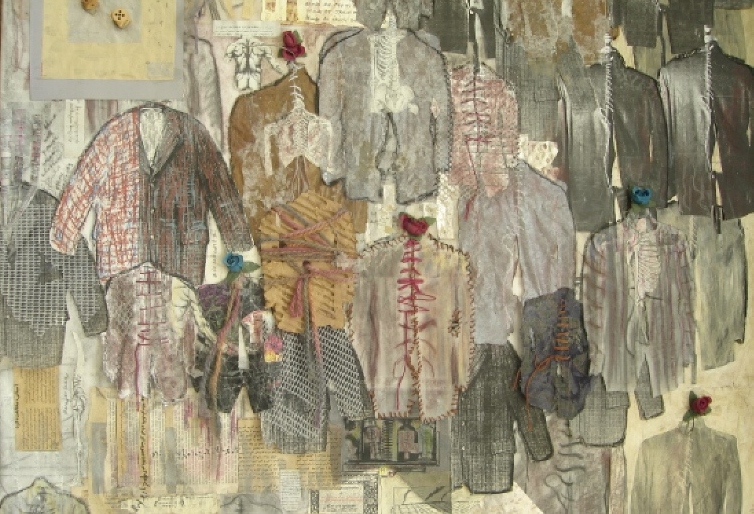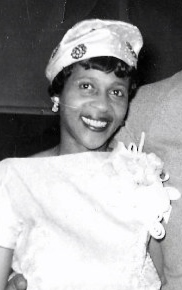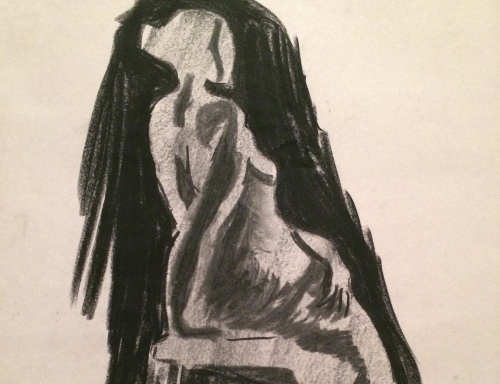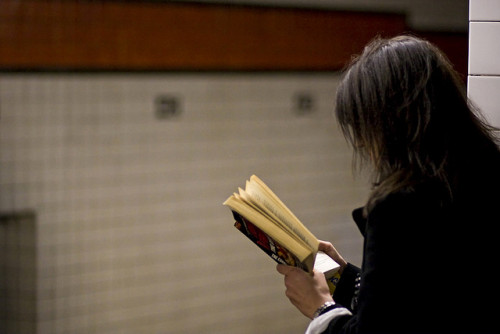
We no longer believed what we’d probably never believed—that the American proletariat would rise up and make a better world.
Memoir by Julie Wittes Schlack, Spring 2015
*
On July 3, 1976, at 7:29 a.m., I dragged to my station in Fountain Hill Mill, past dozens of sewing machines and row upon row of middle-aged women in smocks and short puffy brown hair. Long tables were piled high with shirts, some without sleeves, some without collars, lying limp and menacing like stick hangman figures. Dirty canvas bins were everywhere: next to all the chairs, in front of all the machines, abutting all the aisles, and straddling cracked and fading yellow safety lines. Clusters of knotted threads, piles of fabric shavings, wads of oily piping scraps already huddled underfoot. Jigsaw splashes of light entered through bare spots on the windows where the paint had fallen off.
My boyfriend Mark and I had moved to Allentown, Pennsylvania, about six months earlier to join, organize, and revolutionize the industrial working class. I hated the place, with its small-town suspicion of outsiders; its grid of flat, graceless row houses abutting the sidewalks; its storefront lunch spots touting scrapple and ten varieties of baloney; its gun and ammo stores; its third-shift dive bars serving nothing but Pabst and Schaefer and pickled eggs.
Though I’d had my share of low-paying, menial jobs (waitress, typist, day-care worker), nothing had prepared me for the physical demands of factory work. My first job in Allentown, working second shift at a T-shirt printing factory, required me to stand at the end of a production line peering at wet graphics of television characters Mr. T and Squiggy, searching for drips, runs, or stains. I’d eliminate any I found with a spray bottle of dry-cleaning fluid and a few vigorous scrubs. I hated it. I hated working second shift, spending my daylight hours alone at home in this new town far from any ocean, watching old B movies on television and preparing Mark’s evening and my own midnight dinner in the Crock-Pot.
Within a month of starting at the T-shirt factory, I found a day-shift job in Bethlehem, on the other side of the Lehigh River, a mile or so from the rapidly emptying steel mills and coke ovens lining its shore. Each day, I’d walk from my car past brick row homes planted in the steep hills, with strips of yard lying behind them like licorice sticks. Barely visible at the top of the three-story plant was the sign “Moyer’s Silk Mill, 1894,” framed by blue painted windows and rusty red brick.
On that morning—the day before the American Bicentennial celebration—the horn sounded, and sewing machines turned on like a choir of mechanical gnats, all rumbling and buzzing in different keys. I sat down, popped Born to Run into the Walkman, and fed the first few inches of red piping into an attachment at the front of my machine. I folded the piping over the sleeve as it passed through it, lining up the straight edge of the first sleeve with the needle and hitting the foot pedal. After a few loud seconds a piped red sleeve emerged, elegant and neat, with its line of twin stitches like high-tension lines on a Nebraska highway.
Scissors nestled in my palm, after sewing two dozen sleeves, I cut the piping, tore off the cardboard ticket tied to the bundle, and stuck it in the drawer of my sewing table. At the end of the day, I’d paste each ticket bearing the price per bundle (typically, anywhere from five to fifteen cents) onto a preglued sheet and turn them all in to the office so that my day’s earnings could be calculated. As a piece-rate worker—paid based on how many bundles I completed each day—I was pathetic, generally failing to produce enough to earn the $2.75-per-hour minimum wage they had to pay me. The pros—the competent women with the good work (generally fabrics that fed easily through the machine and didn’t gather or fray)—could make double that, some as much as $6.50 an hour. But me, I was what they called “working average”—someone just productive enough to be kept on the job, but not efficient enough to actually make a living wage at it.
As I picked the next bundle out of the bin, I could feel the morning’s rhythm developing, a steady rocking into the machine and back, the binful of sleeves providing enough easy work to keep me on automatic until lunch. With the Walkman on, I felt like I was watching TV with the sound turned down. Other people’s lips moved, and every so often some sound would penetrate the miniature headphones.
“Who the hell’s got my five-inch folder?”
“Marion, I need work!”
“Well, there ain’t no more goddamn Peacock Blue!”
The bathroom door in front of me was in constant motion. Each time it opened, a gray wave of smoke rolled out, with women trailing in its wake. By midmorning I was breathing through my mouth, trying not to take in the smell of stale cigarettes and sluggish plumbing.
Halfway through the day, Marion the floor girl—a nonunion job with a bit less authority than a foreman—banged her scissor handles on the Coke machine. She had terrible teeth and a tight face, pulled tighter by a long brown ponytail. “Eleven-thirty, girls,” she hollered.
Normally, the women would pull out their lunch bags from under their sewing machines and file outside to lean on the factory wall, smoking or eating. But today, in honor of the next day’s Bicentennial festivities, Grace and Marie and Maria-Facenda created some empty space on one of the long sorting tables, and women laid out their potluck lunch contributions. Plastic bowls of German potato and macaroni salads, platters of salami and cream-cheese pinwheels, and trays of pigs in a blanket formed a line down Ronny’s sorting table. Between the lunch and a high, floppy pile of shirts lay six inches of bare wood and an Avon catalog.
“This table’s a mess.” Grace began scrubbing it with a Handi Wipe she pulled from the pocket of her smock.
Grace and Marie could have been twins. Both had pale, doughy complexions beneath brown beehive hairdos. Both favored delicate floral patterns on their sewing smocks. But Grace wore delicate wire-rimmed glasses when she sewed or leafed through her Ladies’ Home Journal on break, while Marie was twice her size and never appeared to read anything.
Anna, single-needle operator and shop chairlady for the union, stepped delicately between bins and set down a large box on the sorting table. Grace and Anna gazed at the cake sitting crownlike inside it, God Bless America in oozing blue letters on top.
“What do you girls have planned for the holiday?” Anna asked. Though she worked piece rate like everyone else, the “you girls” gave her away. She was always looking for ways to distance herself from the others, to drop allusions to her steward training sessions in New York and inside knowledge of union affairs, even to her conversations with the plant owners, Nate and Isaac.
“The usual,” Marie answered. “Picnic, horseshoes, drag King Keith back to the truck and tuck him into bed, then take care of the other baby.” King Keith was her husband, “a useless lug nut,” and “the other baby” was the son her daughter had given birth to a few months earlier, much to the surprise of his oblivious grandmother, who had somehow failed to realize that her daughter was pregnant.
“I’m actually going to be marching in Philadelphia,” I said nervously. “In a demonstration. Against the government.” Grace and Maria-Facenda looked at me politely, but Anna’s lips pursed in annoyance and Marie flat-out smirked. “You know, for jobs and economic justice,” I added weakly. I thrust fliers in their general direction. When nobody reached out her hand to take one, I laid them on the table.
Above an illustration of a multiethnic crowd holding a banner, bold red type blared, “We’ve carried the rich for 200 years. Let’s get them off our backs.”
The Bicentennial hoopla is in full swing already, and it’s going to get worse. Red, white, and blue hydrants, license plates, beer cans; Bicentennial Minutes on TV; Revolutionary War leaders used to advertise everything imaginable. But behind all these quick-money schemes stands a public relations smoke screen. The millionaires and their cronies who run this country are trapped in a real economic crisis; these parasites are trying to use the Bicentennial to cover up 200 years of exploitation and convince the people that we have the best of all possible worlds, so that their profit-making system can keep alive.
At this point, I was supposed to invite them to abandon their horseshoes and hot dogs in favor of marching through North Philadelphia, demonstrating their anger at the bourgeoisie and inspiring others to join the fight for JOBS OR INCOME NOW! But I knew better than to even try. We already have jobs, Marie would sarcastically point out. And if I countered that the pay and working conditions were terrible (everyone had chronic sinus infections from the fabric dust and toxic lubricant we’d spray on the sewing machine needles, and the color of our sneezes each night told us what fabric we’d been working with that day), she would reply that some of us, those of us who actually know how to sew, are doing just fine, thank you very much. If I argued that many people had no jobs, Grace would suggest that those people should go back to where they came from, and Brazilian-born Maria-Facenda, still desperate after twenty years to prove her naturalized-citizen bona fides, would fervently agree.
As a college-educated outsider, I was already strange. They simply couldn’t fathom why I was there. Big believers in loyalty, they mistrusted me far more than the union and mill bosses I was trying to mobilize them against. After all, I was a traitor to my class. Who wouldn’t want to be a boss if that meant a new car and a trip to Disney World, maybe even a cruise, every year? In truth, if I was betraying anyone, it was probably my long-dead grandfather, a failed garment boss in his own right who’d banned his son from ever working in the shmata business. Though not an order issuer himself, my father, with stoic irony, couldn’t help but observe an unwelcome symmetry in his daughter’s return to the grueling, ill-paid trade that he’d spent his own life fleeing.
“I think it’s disgusting,” Anna said, picking up a flier, then letting it flutter from her hand back onto the sorting table. “This is the greatest country on earth.”
“You tell her,” Maria-Facenda nodded with solemn vigor.
“Sure, it’s a great country in a lot of ways,” I answered carefully. “But that doesn’t mean it couldn’t get a lot better, a lot more fair.”
Marie rolled her eyes. “Everything could get better. Take my husband, for example.” She winked at Grace, who erupted in surprisingly raucous laughter. “That doesn’t mean I walk up and down with a picket sign outside my own house. Family stays together.”
“Yeah, but we’re not all family,” I answered.
But Marie had moved on. “Of course, inside the house, that’s another story.”
“I know. I heard you last night,” Anna said. “My husband said, ‘What’s that? A coyote killing a puppy?’ But I told him, ‘No, that’s just Marie talking to Keith.’”
And so it went.
When the 3:30 horn sounded that day, Maria-Facenda and Grace and Marie stood, folded their smocks, and dusted their pants. Grace, muttering to herself, rearranged the plastic flowers and photographs on her machine. Maria-Facenda wiped away the clusters of thread that lay like painted tears on the cheeks of her plaster Jesus. On her way out, as she walked past me, Marie picked up the stack of fliers still sitting forlornly on the sorting table and, with a broad smile, dumped them in the trash.
Bullied women became bullies, and the piece-rate system was social Darwinism at its most gloriously cruel. My coworkers, incentivized to compete, literally fought over scraps and hoarded the “good” scraps that were theirs, looking down and not around them. Like kids not picked for the starting team, they turned on those even lower in the food chain than they were, to inflate their own sense of worth.
But knowing that didn’t help. Humiliated and angry, I picked up my bag and wore my filth past the senile guard and out into the muggy afternoon.
* * *
Despite my loneliness, I wasn’t totally isolated. I’d made a handful of friends. Ruth, one of the few black women in the plant, was also one of the few to embrace the idea of class struggle without any help from me. I’d met her in my first week or two at Fountain Hill Mills, when one day at lunch she raised her eyes and looked at Anna, who was earnestly conferring with Nate, one of the plant owners. “That Anna, she kiss any more ass, and she’ll be as brown as me.”
I laughed.
“She should have some pride. I don’t know what that woman does for self-respect. My kids give more thought to their pet mouse than she do to the whole damn shopful of people she supposed to be standing up for.”
“You can say that again.” Please do, I thought. Say it louder.
“And how about Kojak?” she said, jerking her thumb toward Nate. He was a big man, with a shaved knobby head and a fat cigar in his mouth, wrapped in tight size-40 jeans, a black satin cowboy shirt, and a heavy silver belt buckle with Levi spelled out between the legs of a rearing bronco. A gaping hole between shirt snaps exposed a fold of pale flesh. “I don’t know about you, but I just wet my pants every time he comes into view.”
An honest-to-God proletarian hero, I thought to myself, and quickly got to know Ruth. We’d hang out at lunch, smoking and talking about the state of the world, and she even came to a few political events. But as a mother of three, with a husband who worked second shift (“he gets them by day, I get them by night; I’m the lucky one”), Ruth’s time was scarce. And when she moved from the sewing floor to the cutting room in the building next door—one of the few women to succeed in fighting for that higher-paid, higher-skilled job—I saw even less of her. Productivity trumped all. Ruth was fast and unfailingly accurate in dissecting the big bolts of cloth.
At that point, I started spending my lunches with Martha, a quiet redhead my age, and a presser named Jay. Sometimes we’d go to Martha’s apartment after work and watch General Hospital, or accompany her to see her boyfriend’s band play Springsteen and Bob Seger covers at the Legion hall. Jay, a guitar player with a ponytail, piercing eyes, and a community college degree in culinary arts, had a cover band of his own. When the weather was warm enough, we’d hang out in the parking lot listening to the car radio, or walk around the neighborhood, where Martha would guess the price, number of bedrooms, and wallpaper patterns of every house we passed.
“Are you practicing to be a real estate agent or what?” Jay had finally asked her.
“There’s worse things to be,” Martha answered. “I wouldn’t mind going in and out of people’s houses all day and just looking at their stuff.”
“You mean their mail, or pictures of their kids?” I asked.
“No, I don’t give a shit about that. I mean furniture, curtains, mirrors; you know, their stuff.”
“Personally, I never saw the point in having real estate agents in the first place,” Jay said. “I mean, I don’t see why you can’t just talk to the person who owns the house and work it out. I don’t see why you need this person in the middle going ‘he says this’ and ‘she’ll settle for that.’ It’s like having a translator when you’re both speaking the same language.”
Martha began throwing Tic Tacs into the gutter, one at a time, delicate little tosses, arcing from her fingertips to a crescent of rotten leaves rimming the sewer grate. “Realtors exist because, left to their own devices, people won’t work it out.” Martha wasn’t ignorant. Her credo was: drop out and turn on. When I’d try to enlist her to come to a lecture or a demonstration, she’d flash a patient smile, roll a joint, and tell me that outlaw country singers Waylon Jennings and Willie Nelson were her political heroes.
“Oh, man, I don’t believe that,” I protested. “I think that if people could get over their petty differences and see that it was in everyone’s interests to work together—”
“And how are you going to make that happen?” she asked.
“I don’t know exactly. But I think—”
“That’s right,” Martha said grimly. “You don’t know, because it can’t be done. You just wake up, come into work, go home, fuck your boyfriend, watch TV. Just like me. We’re like a line of hens at a Perdue chicken farm, you know?”
Jay laughed. “Man, that’s harsh.” He stuck out his chin and bobbed his head.
Martha chirped, “Bawk, bawk-bawk-bawk,” taking the first high-footed step back to the plant.
* * *
The pathetic peak of my organizing efforts at Fountain Hill Mills came about a year later, when I succeeded in persuading Jay to run for shop steward. With the earnestness of a student-council election committee, we taped up posters featuring his picture captioned with a big, bold demand to “Take Back the Union!” We wrote leaflets decrying the piece-rate system that drove workers to produce more and more, while fellow workers were jobless. And when the election results were announced, Jay got 23 votes out of the roughly 250 cast.
There had been a severe thunderstorm that afternoon, with gusty winds that blew down one of the electrical lines leading into the plant. One end of the dangling wire curled on the sidewalk, hissing and jumping. After punching out, everyone gathered around it. The security guard dug into the toolbox in his trunk and came out with a metal washer. He threw it at the downed wire, but the wind caught it and it sailed over the spitting tip. Then came nuts, bolts, and connectors that hit their target, making the wire writhe. The circle grew, and the women all watched, as if taunting a caged and dangerous animal, grateful for its liveliness, excited by its helplessness.
* * *
I left Fountain Hill Mills soon after for a series of jobs in electronics factories. They were as clean as the garment mills were filthy. I earned a low but stable hourly wage, and there was something aesthetically pleasing in assembling the multicolored transistors and resistors, loading them into printed circuit boards, and soldering them into place. Though I didn’t understand the physics of electronics, I loved the poetry of its language, the transmission and capacity of current, the easy flux of solder from glowing liquid to solid. I worked mostly with men. While they could be just as cruel to each other as the women in the garment mills, their jabs were funnier. Many of them had been in the military and went to New York regularly, even if just to see Yankees games. Their worlds were bigger.
Mark and I had gotten married, had a baby, and established a small but reliable social circle. Occasionally we’d have barbecues with the couple next door, a hairdresser named Cindy and her dumb but sweet husband, Harmon, who worked at the Sunoco station. Domingo, a chain-smoking Dominican, down the block, always sitting on his stoop or working on his car, ambled over whenever we stepped outside, to talk about the Iran hostage crisis or the Panama Canal Treaty or Muhammad Ali’s loss to Leon Spinks.
Mark had befriended Ken, a guy at the Caloric stove factory where he worked, and through him, we loosely folded into a group of people our age who had grown up in the Lehigh Valley. On summer days we’d cheer at Ken’s softball games or go swimming in the local quarries, where the water was clear and the sunfish were so plentiful and fearless that they’d nibble on our toes. We had lazy long evenings at the drive-in, where we learned to bring lawn chairs and coolers and have moonlit picnics.
But most nights, we watched television, prepared our lunches to take to work the next day, cut grocery coupons, worried over the bills, and cared for our daughter. “What is to be done?” I’d murmur to her every night (echoing Lenin’s famous 1902 tract), then answer with a singsong litany: First we change your diaper. Then put on your jammies. Then we feed you dinner. Yum-m-m…milk again. “What is to be done?” I’d ask myself the next morning as I reeled through my checklist: diaper bag, lunch, purse, keys.
I felt less and less like a poser as our days took on the same silhouetted routines as everyone around us. We’d made a life not so different from those of the people we’d come to rescue, one of yawning tedium and small pleasures, but also marked by a nagging despair at our own inertia. We’d been to college and knew how to fit in among high-achieving people. We read books and The New York Times, had been to Europe, didn’t say “ain’t,” and had good teeth. A road back to an easier, more stimulating life beckoned to us.
But taking it, resuming the lives we’d been born into, felt shameful, even though we no longer believed what we’d probably never believed—that the American proletariat would rise up and make a better world. And much as we longed to return to a big city, we were scared. We’d been off the expected path for several years, during which our college friends were becoming doctors and lawyers. Unattached and childless, they were going to clubs and taking up jogging.
Circumstances eventually made the decision for us. My father had a frightening cardiac episode that left us all wondering how many years he’d have left. I wanted our daughter to know her grandparents.
We moved back to Boston, and it wasn’t long before we could refer to “the Allentown years” with rue and relief, while still basking in the praise of friends who lauded us for having been true to our convictions. “Having been,” because we no longer were.
When I struggle to remember who I was in the 1980s, I think of the accounts I’ve read about freezing to death. People describe the hush of it, the drowsy enchantment.
Now, after all these years of torpor, I think I’m waking up. The clang of pots and pans struck by anti-government marchers in Istanbul, the din of chants in Hong Kong, the thump and cheers of climate change protestors in New York—they make sleep impossible.
*
Julie Wittes Schlack writes essays, short stories, and articles for the business press. Her essays regularly appear in Cognoscenti, and her work has been published or is forthcoming in numerous publications, including Shenandoah, Writer’s Chronicle, The Louisville Review, Eleven Eleven, Ninth Letter, and Tampa Review. Julie received her MFA from Lesley University’s low-residency program. You can read more of her work at www.juliewittesschlack.com
Image by Glorianne Wittes: Glorianne Wittes (www.glowittes.com) is a mixed media artist, as well as a former social worker and therapist. She uses all manner of tools and materials to express the ideas and values she honors, and to explore both outer and inner worlds.

 Saturday, August 15, 2015 at 09:01PM
Saturday, August 15, 2015 at 09:01PM 

